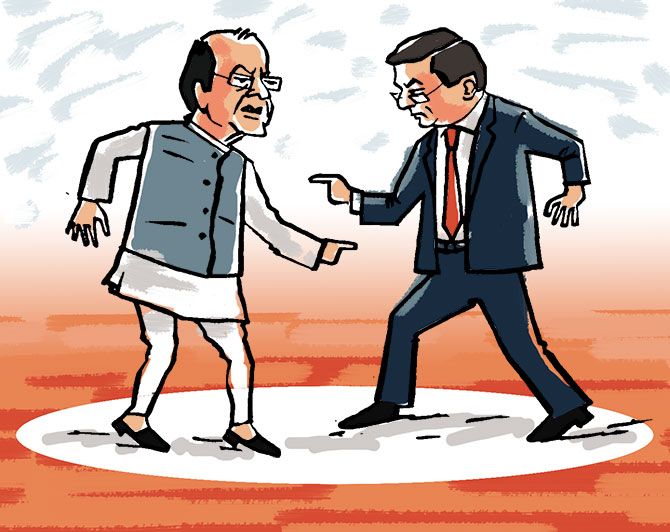'Has the time come to devise Version 2 of ad hoc T-bills?'
'In return, the government must agree to privatise all but five or six banks.'
'If something like this is not done, we will have governments going on the rampage, with increasing frequency,' says T C A Srinivasa Raghavan.
Illustration: Dominic Xavier/Rediff.com

The unseemly wrangle last month between the government and the Reserve Bank of India has reopened several questions, chief amongst which is an age-old one applicable to all sovereigns everywhere at all times: Should I loot, tax or borrow?
Looting is the easiest because if you have the monopoly of force -- physical or legislated -- you can rob anyone. Governments loot all the time. But this annoys the population.
Taxing is a bit harder, not because it is difficult but it costs a lot to collect and often the net benefit is quite small. The government used to spend 85 paise out of every rupee in collecting that rupee.
Borrowing is the easiest option which is why sovereigns, through the ages, have favoured it. Besides if you are the boss, you don't have to repay the loan fully.
Thus, in the old days if the lender became too insistent you simply bumped him off. In medieval Europe, pogroms against the Jews -- who were allowed to lend whereas Christians were not allowed to lend or charge an interest -- were common.
It was partly because of this that Swiss cantons became bankers. They didn't persecute the Jews because there were no sovereigns.
But if the cantons gave us Swiss banking, the borrowing programme of English sovereigns gave us central banks.
In 1694, the money lenders of the City of London, in return for a loan of a million odd pounds, wrested control of the currency from the sovereign.
If you can't repay us through loot and/or taxation, they told King William of Orange, we will simply create the money to repay ourselves. It was a dodgy solution, but because it suited everyone it was allowed to blossom and be replicated everywhere.
Print, and be damned?
But what is the use of being sovereign if you are going to be blackmailed by a bunch of moneylenders?
So in the mid-20th century when, thanks to Keynes, the sovereign demand for money grew and grew, central banks were nationalised.
What we need, said governments, we will print, thank you very much, not you.
This worked well for a while but soon the power to create money went to political heads head and, by the middle of the 1980s, politicians had tied governments into knots.
It happened everywhere, including most recently in the European countries derisively called PIGS.
In India it happened much earlier, when Rajiv Gandhi was prime minister.
During his five years in office, the Budget deficit became four times as much as it was when he started. It was financed by the printing of more and more notes. The man who helped him became RBI governor.
Rajiv left behind a bankrupt government and, if memory serves me right, the guy who told the Narasimha Rao government this nonsense had to stop was a 33-year-old IMF staffer called Urjit Patel.
Then finance minister Manmohan Singh agreed with the idea but resented that mere boys were ticking him off.
In 1994 the government announced that it had decided to stop borrowing via what, since 1955, had been known as ad hoc treasury bills.
In 1997 it even entered into a formal agreement -- how ridiculous can you get? -- with the RBI to end them.
The agreement said three things: That the government would now have the equivalent of an overdraft; that this would not be a source of financing investment; and that it would not show up in the Budget deficit.
Everyone rejoiced.
Revive ad hoc T-bills?
But this was like telling a cat to stop drinking milk, and it has had the same consequence: The cat has become desperate and is angrily hissing and spitting now.
The problem is the Keynesian idea that governments must spend when the need arises, which now means all the time. But where is the money to come from?
Hence my question: Ad hoc T-bills, anyone?
Just because one prime minister got carried away, should India have thrown the baby out with the bathwater?
Has the time come to devise Version 2 of ad hoc T-bills? If not, why not?
There must be a good and convincing answer, a key component of which must be a convincing explanation of the Budget deficit ideal of 3 per cent. This number is not divinely ordained and is merely an IMF benchmark with no logic whatsoever.
In return, the government must agree to privatise all but five or six banks. The State Bank of India and a few other much smaller ones can remain in government control.
If something like this is not done, we will have governments going on the rampage, with increasing frequency.











